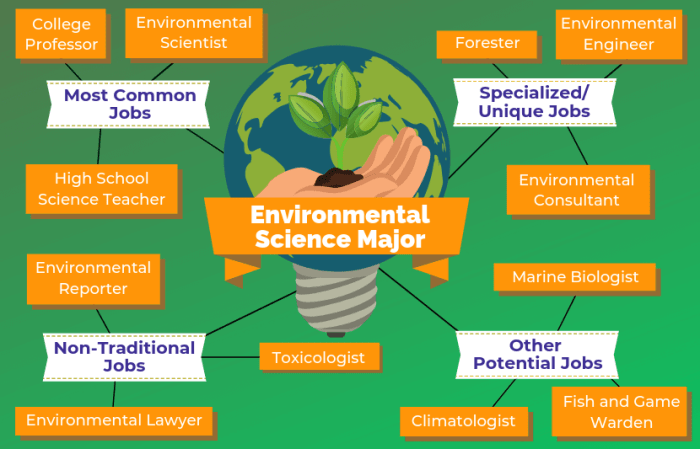Embarking on a journey to unravel the realm of environmental science, we delve into the world of higher education, seeking out the most distinguished universities that cultivate the next generation of environmental stewards. Join us as we explore the pinnacle of environmental science education, where cutting-edge research, transformative curricula, and unparalleled opportunities converge.
Throughout this comprehensive guide, we will navigate the intricacies of environmental science programs, empowering you with the knowledge to make informed decisions about your academic path. From the halls of academia to the forefront of environmental problem-solving, we uncover the institutions that are shaping the future of our planet.
Top Universities for Environmental Science

The field of environmental science has gained prominence due to the increasing concerns about the impact of human activities on the environment. Many universities offer programs in environmental science, but some stand out for their excellence in teaching, research, and facilities.
Here is a comprehensive list of the top universities for environmental science:
Rankings and Recognition
The rankings of universities for environmental science programs are based on factors such as faculty expertise, research output, student outcomes, and reputation. The following universities consistently rank among the top in various rankings:
- University of California, Berkeley
- Stanford University
- Yale University
- Massachusetts Institute of Technology
- University of Oxford
- University of Cambridge
- Imperial College London
- ETH Zurich
- University of Toronto
- University of Michigan
Research Facilities and Faculty Expertise
Top universities for environmental science have state-of-the-art research facilities and a team of renowned faculty members. These facilities provide students with hands-on experience in environmental monitoring, data analysis, and modeling. Faculty expertise covers a wide range of environmental disciplines, including ecology, hydrology, climate science, and environmental policy.
Student Outcomes
Graduates from top environmental science programs are highly sought after by employers in various sectors, including government agencies, environmental consulting firms, and non-profit organizations. These programs prepare students for successful careers in environmental research, policy-making, and management.
Curriculum and Coursework
Environmental science programs at these universities provide a comprehensive curriculum that balances theoretical knowledge with practical experience. Students gain a solid foundation in environmental science principles, including ecology, hydrology, geology, and environmental chemistry.
Specialized courses delve into specific areas of environmental science, such as climate change, water resources management, and environmental policy. Research opportunities allow students to work alongside faculty on cutting-edge projects, while field experiences provide hands-on learning in real-world settings.
Coursework
- Ecology
- Hydrology
- Geology
- Environmental chemistry
- Climate change
- Water resources management
- Environmental policy
Specialized Courses
In addition to core coursework, many universities offer specialized courses that allow students to tailor their studies to their interests. These courses may cover topics such as:
- Environmental impact assessment
- Sustainable development
- Renewable energy
- Environmental law
Research Opportunities
Research is an integral part of environmental science education. Students at these universities have the opportunity to participate in faculty-led research projects, often through internships or independent study courses. This hands-on experience allows students to develop their research skills and gain valuable experience in the field.
Field Experiences
Field experiences are an essential component of environmental science education. Students at these universities participate in field trips, laboratory exercises, and internships that provide them with hands-on learning opportunities in real-world settings. These experiences help students to apply their classroom knowledge to real-world problems and develop a deeper understanding of the environment.
Research and Innovation

Environmental science universities are at the forefront of groundbreaking research and innovation, driving advancements in environmental understanding and solutions.
Faculty members lead cutting-edge research projects, engaging students in hands-on experiences. These projects address pressing environmental challenges, such as climate change mitigation, sustainable resource management, and pollution control.
Faculty Research Projects
- Investigating carbon capture and storage technologies to reduce greenhouse gas emissions.
- Developing innovative water purification systems for regions facing water scarcity.
- Studying the impact of climate change on biodiversity and ecosystem services.
Student Involvement
Students actively participate in research projects, gaining valuable hands-on experience and contributing to the advancement of environmental knowledge.
- Conducting field research to monitor air and water quality.
- Developing models to predict the effects of climate change on coastal ecosystems.
- Collaborating with industry partners to design sustainable solutions for real-world problems.
Industry Collaborations
Universities foster strong partnerships with industry leaders, facilitating the exchange of knowledge and resources.
- Collaborating with energy companies to develop renewable energy technologies.
- Partnering with environmental consulting firms to provide expert advice on environmental impact assessments.
- Working with government agencies to inform environmental policy and regulation.
Career Opportunities
Graduates with environmental science degrees have a wide range of career opportunities in various industries and sectors. They are equipped with the knowledge and skills to address pressing environmental challenges and contribute to sustainable practices.
Some of the potential job titles and industries for environmental science graduates include:
Environmental Consulting
- Environmental Consultant
- Environmental Impact Assessor
- Sustainability Consultant
Government and Regulatory Agencies
- Environmental Protection Officer
- Natural Resource Manager
- Policy Analyst
Nonprofit Organizations
- Environmental Educator
- Conservationist
- Advocacy Specialist
Research and Academia
- Environmental Scientist
- Professor
- Researcher
Environmental science graduates can also pursue careers in fields such as energy, agriculture, engineering, and law, where their expertise in environmental issues and regulations is highly valued.
Sustainability and Environmental Initiatives
Environmental science programs at top universities recognize the significance of sustainability and environmental initiatives. These institutions are dedicated to fostering a culture of environmental stewardship, promoting sustainability in their operations, and engaging in research that advances environmental knowledge.
Campuses are actively implementing initiatives to reduce their environmental footprint. Sustainable practices are integrated into daily operations, such as energy conservation, waste reduction, and water conservation. Many universities have established dedicated sustainability offices that coordinate these efforts.
Campus-wide Efforts
- Energy-efficient lighting and appliances
- Renewable energy sources, such as solar and wind power
- Green building design and construction
- Waste reduction programs, including recycling and composting
- Water conservation measures, such as low-flow fixtures and rainwater harvesting
Research Projects
Top universities conduct cutting-edge research in environmental science, focusing on critical issues such as climate change, biodiversity conservation, and pollution control. Researchers collaborate with faculty from other disciplines to develop innovative solutions to environmental challenges.
Student Organizations
Student organizations play a vital role in promoting environmental stewardship on campus. These groups organize events, engage in advocacy, and implement sustainability initiatives. They provide students with opportunities to connect with like-minded individuals, learn about environmental issues, and make a difference in their communities.
Summary
:max_bytes(150000):strip_icc()/GettyImages-589893995-0d1068dba1334208b860e54daf3d4cdb.jpg?w=700)
As we conclude our exploration of the best universities for environmental science, we are left with a profound appreciation for the transformative power of education. The institutions we have showcased are not merely academic havens; they are incubators of innovation, advocates for sustainability, and catalysts for positive change.
By nurturing the next generation of environmental scientists, these universities empower them to become agents of change, equipped with the knowledge, skills, and passion to safeguard our planet for generations to come.
FAQs
What are the key factors to consider when choosing a university for environmental science?
Consider factors such as program rankings, faculty expertise, research facilities, curriculum, field experiences, and career services.
What career opportunities are available to graduates with environmental science degrees?
Graduates can pursue careers in environmental consulting, research, policymaking, conservation, renewable energy, and more.
How do these universities promote sustainability on campus?
Many universities have sustainability initiatives such as energy-efficient buildings, waste reduction programs, and student organizations dedicated to environmental stewardship.




